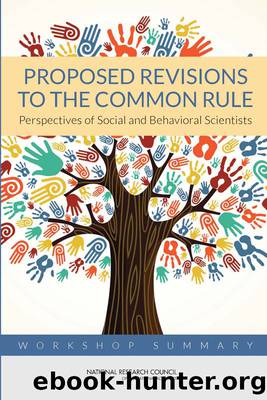Proposed Revisions to the Common Rule: Perspectives of Social and Behavioral Scientists: Workshop Summary by Robert Pool

Author:Robert Pool
Language: eng
Format: epub
ISBN: ISBN0309288266
Publisher: The National Academies Press
Waiver of Guardian Permission
An issue specific to minors is the waiver of guardian participation, Fisher noted. Emancipated minors are adolescents who are supporting themselves and who are, under the laws of their state, considered adults; they may themselves be parents. Mature minors are those adolescents who by state law can independently and without parental permission gain access to health or mental health services. Under federal regulations, both emancipated and mature minors are considered to be adults. However, Fisher said, most states do not include language specific to research participants in their emancipated and mature minor laws, and âthis has been incredibly confusing to IRBs because they donât know whether or not they should require parental permission.â
As a result, she said, IRBs often needlessly require guardian permission for minorsâ involvement in research related to treatment and procedures for which theyâve already obtained a legal right to adult status. For example, an adolescent who can go to a clinic and get sexual health treatment or prescriptions independently under the mature minor rule may still be required by an IRB to get parental permission to participate in a survey that asks about his or her experiences. This requirement could deprive adolescents of their rights and of the potential benefits of research participation, Fisher said.
Waiver of guardian permission is also relevant to Section 46.116 of the Common Rule, which discusses procedures to ensure that âwaiver or alteration will not adversely affect the rights and welfare of the subjects.â When studies involve children and adolescentsâand some other vulnerable populationsâIRBs often overreact when considering what the participants actually understand, Fisher said. However, there is a considerable body of developmental research that can be used to determine whether subjects can give an independent consent, so IRBs should use âevidence-based literature to evaluate whether or not an age group has an understanding of their rights and research procedures.â
Download
This site does not store any files on its server. We only index and link to content provided by other sites. Please contact the content providers to delete copyright contents if any and email us, we'll remove relevant links or contents immediately.
| CPA Test | GMAT Test |
| Statistics |
Cracking the GRE Premium Edition with 6 Practice Tests, 2015 (Graduate School Test Preparation) by Princeton Review(3600)
What It Really Takes to Get Into Ivy League and Other Highly Selective Colleges by Hughes Chuck(3224)
The Marketing Plan Handbook: Develop Big-Picture Marketing Plans for Pennies on the Dollar by Robert W. Bly(2421)
Fooled by Randomness: The Hidden Role of Chance in Life and in the Markets by Nassim Nicholas Taleb(2420)
The Tyranny of Metrics by Jerry Z. Muller(2407)
The Official Guide for GMAT Review 2015 with Online Question Bank and Exclusive Video by Graduate Management Admission Council (GMAC)(2342)
Ultralearning by Scott Young(2327)
50 Economics Classics by Tom Butler-Bowdon(2071)
The Visual MBA by Jason Barron(1635)
The Inevitable by Kevin Kelly(1558)
Data Science for Business by Foster Provost & Tom Fawcett(1514)
Out of the Crisis by Deming W. Edwards(1502)
GMAT Official Guide 2018 Verbal Review by GMAC (Graduate Management Admission Council)(1386)
Cracking the LSAT, 2012 Edition by Princeton Review(1348)
The Conflict Resolution Phrase Book by Barbara Mitchell & Cornelia Gamlem(1348)
Maths and Stats for Web Analytics and Conversion Optimization by Himanshu Sharma(1300)
The Personal MBA: Master the Art of Business by Josh Kaufman(1273)
College Essays that Made a Difference by Princeton Review(1270)
Cracking the SAT Premium Edition with 6 Practice Tests, 2017 by Princeton Review(1255)
